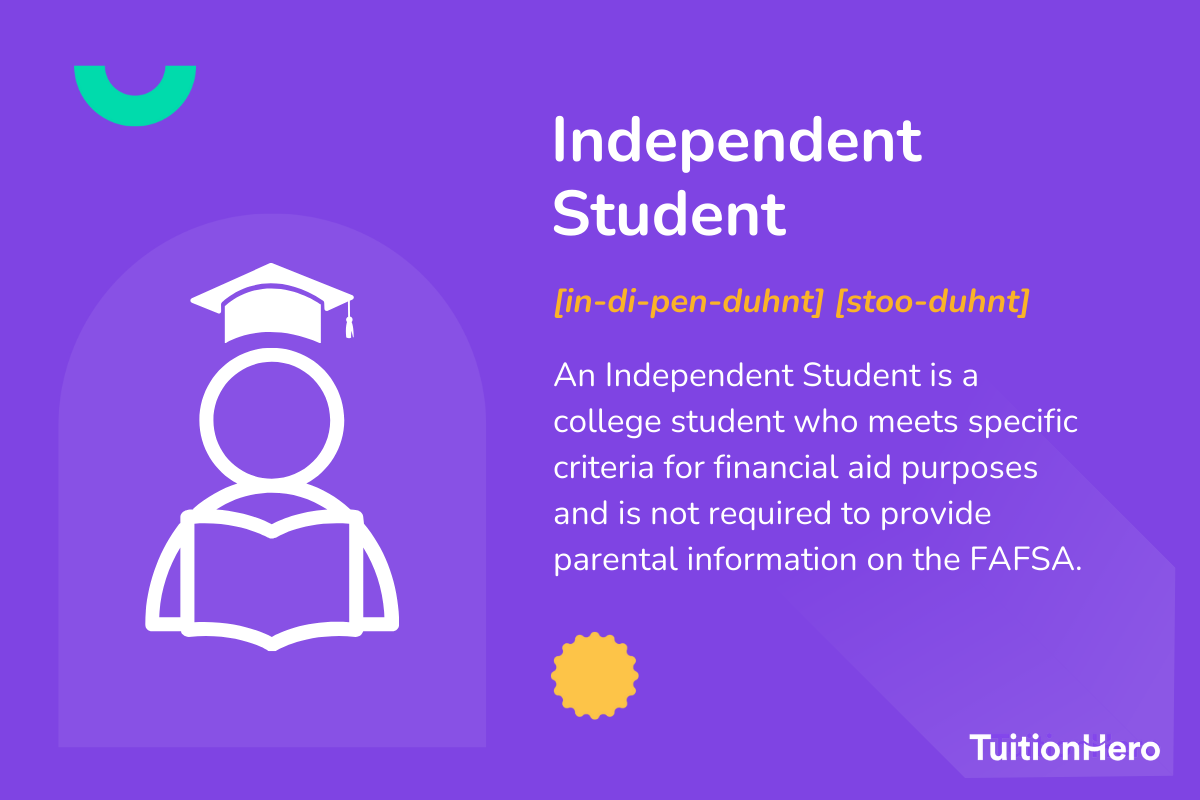Advertiser Disclosure
Last update: November 17, 2024
5 minutes read
What Is an Independent Student?
Are you navigating college finances as an independent student? Learn how this status can maximize your financial aid potential.

By Derick Rodriguez, Associate Editor
Edited by Brian Flaherty, B.A. Economics
Learn more about our editorial standards



By Derick Rodriguez, Associate Editor
Edited by Brian Flaherty, B.A. Economics
Learn more about our editorial standards
Understanding if you're independent or dependent is crucial for getting the most financial aid. Being independent can greatly affect how much help you receive. It's important to know this difference to make the most of your college funding options. For more insights on managing student finances, check out how student loans can work for you.

Key takeaways
- Independent student status significantly affects financial aid eligibility
- Criteria for independence include age, marital status, and other specific factors
- Filling out the FAFSA accurately is crucial for securing the right financial aid
What is an independent student?
An independent student, in the context of financial aid, is someone who doesn't have the support of their parents or guardians to pay for their education. This is important when filling out the Free Application for Federal Student Aid (FAFSA), as it directly affects the expected family contribution (EFC) and, as a result, the amount of aid a student may get.

Key factors that contribute to being classified as independent include:
- Age (24 or older by January 1st of the financial aid year)
- Marriage status
- Graduate or professional student status
- Having dependents other than a spouse
- Active duty military status or a veteran
- Circumstances like being an orphan, emancipated minor, or at risk of homelessness
Independent students benefit from a potentially lower EFC, which means they could qualify for more financial aid. Unlike dependent students, who need to include parental income and assets on the FAFSA, independent students only need to provide their information (and their spouse's, if married), simplifying the process and potentially leading to a more generous aid package.
If you're on your own for money for your education, check out scholarships and grants at TuitionHero. Understanding what it means to be an independent student is important. Let's break down the essential parts of getting financial help for college as an independent student.
Dependency criteria details
Age requirement for independent status
Whether or not you’re independent isn’t a matter of preference. Instead, it’s based on specific criteria set by the Federal Student Aid office. One of the most straightforward paths to independence is age.
If you are 24 or older by January 1st of the financial aid year, you automatically classify as independent. This age factor is important because it means you don't need to prove your independence using other criteria.
Whether or not you’re older or younger than 24, understanding how expected family contribution affects your financial aid is important. It provides a clear idea of how your status as an independent student might affect your aid package, potentially offering greater financial support because your parents aren't contributing to your education costs.
Military and marital status
Military service and marital status offer another path to being recognized as an independent student. Active-duty service members and veterans are acknowledged for their service with this status, which can help get more financial aid for school.
If you're married, the system sees you as separate for financial aid, considering only your (and possibly your spouse's) money. This can affect the aid you get.

TuitionHero Tip
Check out federal direct loans to understand how being independent might change your loans.
Special circumstances: Orphans and emancipated minors
For students who are orphans, wards of the court, or emancipated minors, having independent status isn’t always something to celebrate. However, because these students don’t have parental support, federal guidelines grant them the opportunity for increased college aid.
Acknowledging this isn't just a formality—it opens more accessible opportunities for higher education. If you're struggling financially, look into aid options like Federal Pell Grants—they can make a big difference.
Getting financial aid as an independent student means understanding different types of loans like federal and private loans. By knowing these details, independent students can get the best help for their education.
Compare private student loans now
TuitionHero simplifies your student loan decision, with multiple top loans side-by-side.
Compare Rates
Dos and don'ts of navigating independent student status
To be considered an independent student, you need to know how to fill out the FAFSA form, understand what affects your eligibility for financial aid, and learn how to explain your situation well. At TuitionHero, we’re here to do just that. We can help make things simpler for independent students, helping them get as much financial aid as possible without running into problems.
Do
Do gather all necessary documentation before filing the FAFSA.
Do consult with a financial aid advisor for personalized advice.
Do review and understand the criteria for independent status.
Do explore grants and scholarships that may offer more financial aid.
Don't
Don't assume you automatically qualify as independent.
Don't overlook potential scholarships and grants specific to independent students.
Don't submit incomplete or inaccurate information on the FAFSA.
Don't hesitate to appeal financial aid decisions or look for professional judgment if your circumstances are unique.

Advantages and disadvantages of claiming independent student status
If you’re able to claim independent student status on the FAFSA, it can change the amount and composition of financial aid you get. You might get more aid because you don't have parental support to pay for college. But being independent also comes with increased responsibilities, since you don’t have your parents’ finances to fall back on.
- The potential for a lower Expected Family Contribution (EFC), increasing eligibility for need-based aid.
- Exclusion of parental income and assets from financial aid calculations.
- Increased loan borrowing limits compared to dependent students.
- Eligibility for more grants and scholarships tailored to independent students.
- Stricter documentation requirements to prove eligibility.
- Potential difficulty in covering full education costs without family support.
- The need to manage possibly larger student loans independently.
- The responsibility for all educational and living expenses, which can be challenging without proper financial planning.

Why trust TuitionHero
At TuitionHero, we know how confusing it can be to figure out college finance. Whether you're looking at loans, trying to find scholarships, or filling out FAFSA forms, we're here to help. Our goal is to make the whole financial aid process easier for students and parents. We connect you with good lenders and provide helpful information to get the money you need for college. Let us help you get more financial aid by using your status as an independent student.
Frequently asked questions (FAQ)
If your dependency status changes during the school year due to a big life event, like getting married, becoming a parent, or becoming an emancipated minor or legally homeless, you need to inform your school's financial aid office immediately. The office will guide you on updating your Free Application for Federal Student Aid (FAFSA) and reevaluate your financial aid package based on your new status, potentially increasing your eligibility for certain types of aid.
Becoming an emancipated minor can affect your financial aid because it changes how FAFSA sees your dependency. But don't do it just to get more financial aid. Emancipation is a big deal, meant for young people who really need to be legally on their own, without parents or guardians.
Yes! Some scholarships are specifically for students who do things on their own, like those who were in foster care, veterans, or adults going back to school. TuitionHero can help you find these scholarships, which recognize your unique challenges and want to ease the financial burden of your education.
Final thoughts
Understanding how to qualify as an independent student can boost your financial aid options. TuitionHero provides tools and expertise to guide you through this process.
Whether you're clarifying your dependency status or looking for scholarships, we're here to help. Financing education can be complex, but with our support, it's manageable.
Let TuitionHero help you with this important step. For more help and resources, check out all the information we offer on student-friendly credit card offers.
Source
Author

Derick Rodriguez
Derick Rodriguez is a seasoned editor and digital marketing strategist specializing in demystifying college finance. With over half a decade of experience in the digital realm, Derick has honed a unique skill set that bridges the gap between complex financial concepts and accessible, user-friendly communication. His approach is deeply rooted in leveraging personal experiences and insights to illuminate the nuances of college finance, making it more approachable for students and families.
Editor

Brian Flaherty
Brian is a graduate of the University of Virginia where he earned a B.A. in Economics. After graduation, Brian spent four years working at a wealth management firm advising high-net-worth investors and institutions. During his time there, he passed the rigorous Series 65 exam and rose to a high-level strategy position.
At TuitionHero, we're not just passionate about our work - we take immense pride in it. Our dedicated team of writers diligently follows strict editorial standards, ensuring that every piece of content we publish is accurate, current, and highly valuable. We don't just strive for quality; we aim for excellence.
Related posts
While you're at it, here are some other college finance-related blog posts you might be interested in.
Shop and compare student financing options - 100% free!

Always free, always fast
TuitionHero is 100% free to use. Here, you can instantly view and compare multiple top lenders side-by-side.

Won’t affect credit score
Don’t worry – checking your rates with TuitionHero never impacts your credit score!

Safe and secure
We take your information's security seriously. We apply industry best practices to ensure your data is safe.
Finished scrolling? Start saving & find your private student loan rate today





